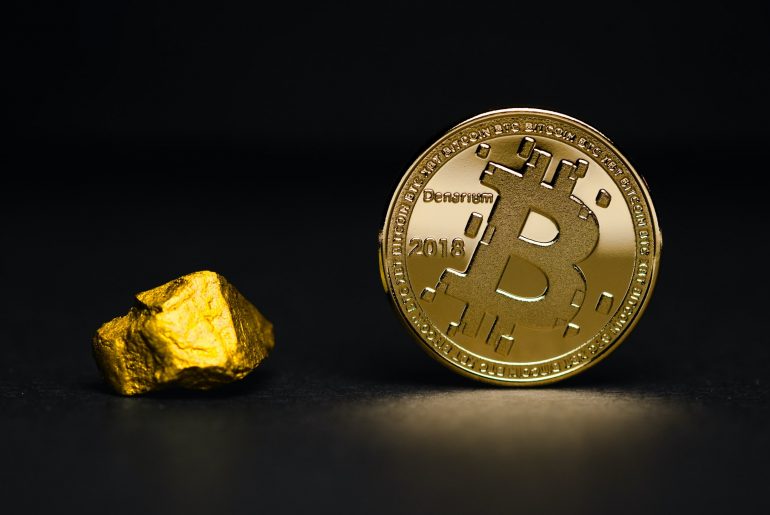This article may contain references to products or services from one or more of our advertisers or partners. We may receive compensation when you click on links to those products or services. Nonetheless, our opinions are our own.
The information presented in this article is accurate to the best of our knowledge at the time of publication. However, information is subject to change, and no guarantees are made about the continued accuracy or completeness of this content after its publication date.

Updated by Albert Fang
Today, the cryptocurrency market is exploding in popularity. Whilst Bitcoin, Ethereum and other altcoins were once dismissed by the mainstream and institutional investors as scams, fads and hype-fuelled innovations with no practical use, they are now seeing unprecedented growth unlike any traditional investment asset that came before them.
In 2011, one bitcoin would have cost you as little as $0.30. In 2017, the price of BTC hit $20,000, which at the time was an all time high. In 2021, BTC has continued to hit ATH after ATH, blasting through the $50,000 barrier and bringing plenty of altcoins on the journey up with it.
With more and more investors getting on board, it is clear that many are beginning to see a future where crypto has a significant place within the world. In predicting the way in which cryptocurrency will take this place, there is a lot to consider.
How Cryptocurrency Works
When it comes to having an understanding of how crypto works, almost all cryptocurrencies differ in some way. With this being said, there are a number of common factors that can be found between them.
Firstly, a cryptocurrency is a ‘digital currency’, and a medium of exchange. It takes the form of tokens or coins, and utilises encryption and blockchain technology to manage the way funds are created, transferred, and stored.
Blockchain technology refers to a decentralised network, or database – it stores blocks on ‘nodes’ that are spread out across a network, connected by a chain in chronological order. This is the technology that facilitates crypto transactions. Blockchain’s decentralised nature means that no one person or entity has control over the network, and that all transactions are visible to everyone. As a result, blockchain and crypto are secure, trustworthy, and accessible.
The Journey of Crypto So Far
Whilst a number of cryptocurrencies have seen huge price increases, this isn’t to say that the journey up was a walk in the park. For example, BTC has seen countless rallies and crashes in getting to where it is today. Investors are now piling into exchanges like Independent Reserve to buy Bitcoin, but with Bitamp bitcoin wallet, the investors now have more easy and efficient ways to buy bitcoin.
The 2017 event of ‘BTC mania’ provides a perfect example of this volatility – at the start of the year, Bitcoin had a value of around $950. By December, the price had hit nearly $20,000. Crypto was a new concept to many, and with immense media coverage and attention, more and more new investors were becoming enthusiastic about Bitcoin.
This Bitcoin hype train came crashing down in the early months of 2018. Bitcoin’s increases were unsustainable, and as people began to cash out and take their profits, the price of the cryptocurrency tanked. By February, BTC was worth less than $11,000. From here, the price continued on a slow decline, hitting lower than $5000 by the end of the year.
Voted "Best Overall Budgeting App" by Forbes and WSJ
Monarch Money helps you budget, track spending, set goals, and plan your financial future—all in one app.
Get 50% OFF your first year with code MONARCHVIP
Why Bitcoin Has Seen a Resurgence in Popularity
Obviously, BTC has since recovered from this particular episode of instability. This isn’t to say that BTC isn’t volatile – its price continues to experience daily volatility in the double digits – however it is performing better now than ever before. When it comes to why, there are a number of factors at play.
One of the biggest boosters of investor confidence has been the sudden influx of institutional investors and the announcement of support from large companies more generally.
Whilst volatility and a lack of regulation have previously resulted in a lack of institutional investment, more and more capital allocators and large companies are considering Bitcoin’s potential. Many institutional investors are beginning to consider BTC as a more significant part of their overall portfolios, resulting in market cap increases, encouraging further media coverage, encouraging more sustainable growth, and increasing retail investor confidence. Most notably, early 2021 saw Tesla invest as much as $1.5 billion – in doing so, they had made a larger profit within one month than the company had throughout 2020 in its entirety.
In regard to support from big business, announcements from large companies have fuelled investor confidence and provided further real world use cases for cryptocurrencies such as Bitcoin. A diverse range of companies are contributing to this factor – a significant example is PayPal, who are now facilitating the buying, selling and holding of crypto for all PayPal customers. This is just one incidence of big business support – Tesla has announced plans to accept Bitcoin payments, and payment facilitators such as Apple Pay, MasterCard and Visa have announced that they will be supporting Bitcoin as well.
Ultimately, the crypto space is significantly more developed, supported and understood than it once was, and the notably higher market caps of cryptocurrencies like Bitcoin, Ethereum, Litecoin and more provide a clear indication of both how the market has reacted to this development, and the extent to which future development might occur.
Why Investors See Long-Term Value in Bitcoin
With investors piling their funds into Bitcoin, a question arises – what value do they see in the cryptocurrency? The perceived use cases that Bitcoin provides, or will provide, have seemingly evolved in recent years, and for new investors and non-investors alike, it can be difficult to pinpoint exactly why any given investor has faith in it.
Upon its creation by Satoshi Nakamoto in 2008, Bitcoin was created as a decentralised currency – its goal was to utilise cryptography, protocols and processes to eliminate the need for central regulation in controlling transactions and token creation. As a result, there are a number of potential benefits that it provides, including:
- Security: Bitcoin provides users with full control over their transactions. Other entities and merchants are unable to force transactions, no personal information is required to be tied to a transaction, and wallets can be secured further with encryption and the use of offline wallets.
- Transparency: Given that Bitcoin operates on a blockchain, the system is transparent and trustable. All transactions can be seen by everyone, all Bitcoin information is readily available, and this information cannot be altered or affected by any entity.
- Freedom: Users are able to send and receive Bitcoin at any time and location.
- Improved fees: Bitcoin also improves upon how fees are paid when making transactions – users have more freedom in choosing how much they pay to send BTC, and the costs of operating blockchain are low in general, as regulation is unnecessary.
These are some of the benefits that make BTC a viable form of currency – and are essentially what give it value. As a result, many investors are putting their faith (and money) in Bitcoin. However, instead of purchasing BTC with the intention of spending it, many see it as an investment or a store of value, in a similar regard to gold.
Investors are using this as a hedge against inflation (given Bitcoin’s limit of BTC to be mined), and as an appreciating asset – essentially, something that will retain or increase in value and purchasing power over time. One particular example of this is evident in Venezuela – given the immense inflation that is impacting the Venezuela economy, many residents are putting their money into Bitcoin and other cryptocurrencies. By holding this value in BTC, their money is retaining (or increasing in) value, rather than being lost to inflation.
Why Altcoins are Seeing Success
While it is true that many altcoins are valuable for the same reasons as Bitcoin, there are a number of popular altcoins with intriguing functionality and value.
The most prominent example of this might be Ethereum – rather than working as a monetary system, it is aiming to be a decentralised software platform. Essentially, it allows a program to be run on blockchain, without any risk of interference, control or fraud. It utilises ‘smart contracts’ and Dapps (decentralised apps) to eliminate the need for third parties in making agreements between two parties, and as a result can program a transfer of value from one entity to another in an efficient, self contained way.
The cryptocurrency of Ethereum is Ether (ETH) – this is used to fuel smart contract execution on the Ethereum network.
In addition to ETH, there are plenty of altcoins out there, with varying degrees of differentiation and success. Notable alternatives include LTC, XRP, ADA, DOT and BNB.
Will Bitcoin Continue to Increase in Value?
Many experts believe that whether or not Bitcoin will continue to increase in value will come down to the value that investors see in Bitcoin. If institutional investors continue to invest in and support Bitcoin and cryptocurrency as a whole, BTC infrastructure will improve, investor confidence will increase, and the value of BTC will continue to rise.
Whilst this may seem like a likely possibility, the volatility and uncertainty that surrounds Bitcoin has historically been an area of concern, and a cause for a lack of confidence in investors. Ultimately, only time will tell whether or not Bitcoin becomes the currency of the future.

Reviewed and edited by Albert Fang.
See a typo or want to suggest an edit/revision to the content? Use the contact us form to provide feedback.
At FangWallet, we value editorial integrity and open collaboration in curating quality content for readers to enjoy. Much appreciated for the assist.
Did you like our article and find it insightful? We encourage sharing the article link with family and friends to benefit as well - better yet, sharing on social media. Thank you for the support! 🍉
Article Title: The Future of Bitcoin and Cryptocurrency
https://fangwallet.com/2021/02/27/the-future-of-bitcoin-and-cryptocurrency/The FangWallet Promise
FangWallet is an editorially independent resource - founded on breaking down challenging financial concepts for anyone to understand since 2014. While we adhere to editorial integrity, note that this post may contain references to products from our partners.
The FangWallet promise is always to have your best interest in mind and be transparent and honest about the financial picture.
Become an Insider

Subscribe to get a free daily budget planner printable to help get your money on track!
Make passive money the right way. No spam.
Editorial Disclaimer: The editorial content on this page is not provided by any of the companies mentioned. The opinions expressed here are the author's alone.
The content of this website is for informational purposes only and does not represent investment advice, or an offer or solicitation to buy or sell any security, investment, or product. Investors are encouraged to do their own due diligence, and, if necessary, consult professional advising before making any investment decisions. Investing involves a high degree of risk, and financial losses may occur including the potential loss of principal.
Source Citation References:
+ Inspo











































